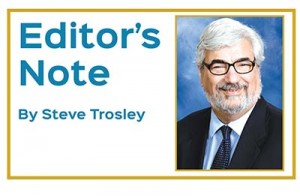“Outside voices” make gossip worse
 We can learn as our children grow. Solomon asked God for wisdom and God should have told him to listen to his children.
We can learn as our children grow. Solomon asked God for wisdom and God should have told him to listen to his children.
I learned the concept of “inside voice and outside voice” when my oldest child started grade school. She explained to me one day when her brother and sister, twins two years her junior, were being especially noisy. “Dad, you should tell them that in the house, they should use their inside voice,” she said. “They’re using their outside voices and I can’t hear the TV.”
I liked the concept. The inside voice is softer, discreet and controlled. The outside voice is loud, reckless and often out of control – and in some cases, dangerously unaware of Matthew 12, where Jesus said, “I tell you that everyone will have to give account on the day of judgment for every empty word they have spoken.”
Empty words: We hear them each day coming from the mass media, the people around us and our own mouths. They come from people using their cell phones but more often, they come from people having private conversations in restaurants, the workplace, even ballparks, unaware that their volume control has reached maximum.
My situation is atypical. Reporters can read documents on desks upside down and have an uncanny knack for picking up on interesting conversations. Even old reporters, given good hearing aids like the ones I wear, hear some empty words in public places:
“HR calls it a problem, but I’m telling you I’m going to make sure no one in my department over age 50 survives the next budget cutback…”
“If he would have listened to me, he would not have lost that case. Sloppy preparation and late filings will kill you every time. If the client realized what happened, he’d be suing for malpractice…”
“Daryl may be the boss, but we’ve been making sure nothing he plans gets done…”
“Shouldn’t someone tell her what she looks like in that outfit. I mean, Barnum and Baily have closed up shop…”
Of course, the point of the Gospel is not how loud you are talking, but what words you choose in your conversations and discussions. Ephesians 4:29 sets the standard: “Do not let any unwholesome talk come out of your mouths, but only what is helpful for building others up according to their needs, that it may benefit those who listen.”
The story goes that a pastor gave a homily one Sunday on the evils of gossip. A woman in the congregation was so moved by the homily, she went to confession that very day and confessed how she had crudely slandered a co-worker. The pastor told her that for her penance, she needed to take a feather pillow to the top if the church belfry, tear it open and shake the feathers out into the air. Then she should return to him.
When she returned expecting absolution, he instead told her to go and collect the feathers from the pillow.
“Impossible,” she cried. “By now the wind has scattered them all over town.”
“And so it is with gossip,” the pastor said.
I’m not wise like the pastor in that story, but I have a theory. Maybe if we start thinking about how loud we’re talking and focus on using our inside voices, we might become more aware of the words we’re choosing to use. Are they building people up or tearing them down? Are they generated in anger or fear, or in kindness and respect?
Will they strengthen or build a relationship or make someone suggest that we “take it outside”?
Forty-eight years ago this week, on a 96-degree day in a church housed in a Quonset hut, the former Linda Peipert became my wife. Let’s give her a nice round of applause, shall we?












